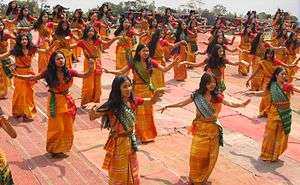Bodo people
 Bagurumba, the traditional Bodo dance | |
| Total population | |
|---|---|
| c. 1.5 million[1] | |
| Languages | |
| Bodo language | |
| Related ethnic groups | |
| Bodo-Kachari, Kachari people, Hajong people, Garo people, |
The Bodos (pronounced [boːɽoː]) are an ethnic and linguistic group of the Brahmaputra valley in the northeast part of India.
Bodo Tribe of Assam - are known to be the earliest settlers of Assam, and the first to cultivate rice and rear silkworms in Assam. The word 'Bodo' has been derived from the word 'Bod' which means Tibet. The Bodos speak the Bodo language.[2]
They are recognized as a plains tribe in the Sixth Schedule of the Indian Constitution. Udalguri, Chirang, Baksa, Sonitpur, Goalpara, Dhemaji, Lakhimpur, Kokrajhar of Assam are considered the centre of the Bodo People. The Bodos living in West Bengal, Nepal are called Mech (pronounced 'meche' in Nepal). The Bodos use the term Bodosa (which is pronounced as Borosa meaning son of Bodo) to describe themselves.
Language
The Boro language is one of the languages of the Sino-Tibetan or Tibeto-Chinese speech family. It belongs to the Boro, Naga group of the Assam-Burmese branch of the Sino Tibetan family.
Religion
Bodos traditionally practise Bathouism, which is the worshiping of forefathers, known as Obonglaoree. The shijou plant (Euphorbia genus) is taken as the symbol of Bathou and worshiped. It is also claimed as the supreme god. In Bodo language, Ba means five and thou means deep. As Bodos believe in five mighty elements of God, which are Land, Water, Air, Fire and Sky, five has become a significant number in the Bathou religion.
The Shijou tree is encircled with eighteen pairs of designed bamboo sticks and five pairs of ring of bamboo. In front of Shijou within encircled bamboo ring there is a 'Dove Heart'.[4]
According to the concept of Bathouism, before the creation of universe, there was simply a great void, in which the supreme being 'Aham Guru', Anan Binan Gosai or Obonglaoree existed formlessly. The supreme god Aham guru became tired of living formless existence and desired to live in flesh and blood. He descended on this great void with all human characteristics. Thereafter he created the universe.[5]
See also
Notes
- ↑ "2011 Estimates as per Census report 2001" (PDF).
- ↑ "Bodos - the Earliest Settlers of Assam". OK! North East. Retrieved 2018-07-31.
- ↑ Census of India - Socio-cultural aspects, Table ST-14, Government of India, Ministry of Home Affairs, 2001
- ↑ "HOME". udalguri.gov.in. Retrieved 2017-04-02.
- ↑ Basumatary, Dhuparam. Boro Kachari Sonskritir Kinchit Abhas. pp. 2–3.
References
- Pulloppillil, Thomas and Aluckal, Jacob (1997) The Bodos: Children of the Bhullumbutter,
- Mushahary, Moniram (1981) Bodo–English Dictionary,